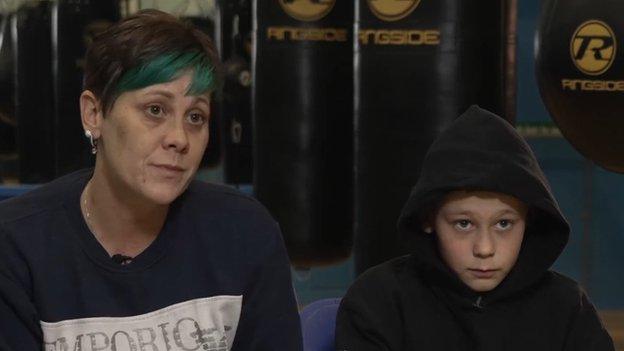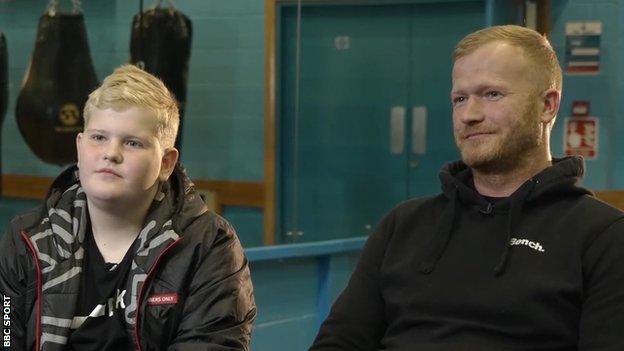Cost of living: Families on balancing rising costs and children's exercise
- Published
Cost of Living: People are genuinely struggling
The rising cost of living is forcing people across the UK to make difficult decisions.
For some, that means choosing between having the heating on or feeding their family.
For others, it has meant making savings in other areas, such as having to limit exercise classes for themselves and their children.
BBC Sport visited the Mansfield School of Boxing and heard about the choices some families are being forced to make when it comes to balancing rising living costs. We also spoke to swimmers at Rye Leisure Centre in Sussex as their pool closed until at least spring 2023.

Eleven-year-old Paul has Attention Deficit Hyperactivity Disorder (ADHD). He says boxing helps "keep my mind concentrated" and his mum Sarah has noticed his behaviour has "calmed down quite a bit" since he began attending the Mansfield gym.
"Because he's got mental health problems, coming to boxing is a relief for him," she told BBC Sports News correspondent Laura Scott.
"We just have to tighten our belts up so we can still afford to bring him here."
She pays just under £10 a week for Paul to attend classes but says things will become more difficult during the winter months.

Sarah says boxing training helps her son Paul, 11, with his ADHD
"Because of my disability, I'll have to have the heating on a little bit more and then it's just going to be difficult to bring him here with how tight money is," she said.
"We try our best to keep him here but then we've got to think what's more important: the heating, food and electric, and keep him off, or cut down and keep him going?
"[If he stops] his mental health is going to go down again, and his energy will be up and he'll be up and down. It's a very hard decision for parents."
A recent survey commissioned by UKactive, a non-for-profit organisation, stated that 43% of its 2,002 respondents said the rising cost of living will have a negative impact on their ability to participate in sport and exercise.
For Ilo, whose 13-year-old son Emils attends the gym twice a week, the decision is simple but stark.
"Sport is the priority, for sure. If we need chose between food and sport, we are going to eat less," he said.
"Sport is going to be the last thing we're going to cut out of our family."

Ilo, right, and 13-year-old son Emils, don't want to give up exercise - even if it means difficult decisions on other bills
Marcellus Baz, whose charity Switch Up established the club, says he "struggles to sleep at night" because he fears people are slipping through the cracks as they struggle with rising costs.
Donations from local businesses have helped the gym let people who cannot afford the fees to continue coming, but Baz says more needs to be done.
"Off the back of pandemic people have been really struggling and haven't recovered and then you have cuts all over the place," he said.
"The cost-of-living crisis is just the last thing. Fuel has gone up, food has gone up, energy bills have gone up. People are really genuinely struggling and they don't know what to do."
A survey of public sector operators, conducted by UKactive, showed:
Leisure services are expected to be reduced or lost entirely in 40% of council areas before the end of March 2023
Leisure services are at risk in 74% of council areas by the end of March 2024
UKactive chief executive Huw Edwards says the cost-of-living crisis, on the back of the financial impact caused by the coronavirus lockdowns, has had a wide-ranging impact.
"The stories we are hearing right now are of people losing facilities that they love and supports their physical and mental health," he said.
"I worry that this could create a major physical and mental health crisis in the country if we don't find solutions in the coming weeks to support these facilities through the winter."
In September, the government announced a six-month package to help households and business customers, but energy prices could still rise sharply again in April.
"The cost is that there is a deterioration in the health of a nation through the loss of these essential facilities," Edwards said.
"This is about health and this is about the health of families, of communities and the nation."
On Tuesday, the swimming pool at Rye Sports Centre in Sussex temporarily closed, with the operator saying it cannot "absorb" the annual £92,000 cost of maintaining the pool.
Not-for-profit Freedom Leisure - which runs 19 leisure centres with swimming pools on behalf of local councils in the South East said its annual energy bill has increased at an "alarming rate" from £8m to £20m nationwide. It had already recently lowered pool temperatures.
Emotional swimmers at Rye told BBC Sport said they were losing "a social community" and instructor Zara Riseborough said she was "absolutely gutted, really upset for them all". She added: "This was a vital lifeline for a lot of people, physically and mentally."
Swim England have warned that this won't be an isolated case and more than 100 pools could be under threat in the next six months.
Britain's two-time Olympic swimming gold medallist Rebecca Adlington told BBC Breakfast: "We need to be careful. Swimming is a life skill, it isn't just a sport.
"We're seeing the number of drownings going up, obesity going up. There is so much more to swimming. We need to start seeing it as a life skill. We're surrounded by water in this country, you can't escape that.
"People are thinking about what they can cut back on. You're not going to cut back on your food, heating your house - it's those things that are for you mental or physical health that are going to slip away first."

BBC Sports News correspondent Laura Scott
Over the past week I've witnessed close-up two very powerful examples of the serious impact that the cost-of-living crisis is already having on sports participation.
There was the raw emotion of the swimmers at Rye Sports Centre over losing their much-loved facility, which they told me offers so much more to them than simply sport.
And the stark honesty of families at the Mansfield School of Boxing about where being active ranks in their budgeting dilemmas this winter.
The warnings from authorities are that these stories will be being replicated around the UK, as the sector finds itself in what many are calling a more perilous position than the pandemic.
It will take time to see the impact on participation levels, but it will be no surprise to see this compounding the physical inactivity crisis and deepening inequalities across the UK.

Baz added: "At the moment we're looking for solutions and the solution we've got is the donations that we're getting from business; fundraising, regular donations or paying for that support.
"Sometimes I'm going home, I'm struggling to sleep and thinking we can't fail people that are struggling, that have got no need, that have got no help, no hope.
"Everybody should have to look ahead and see a bit of glimmer of light. This community hub was set up to be able to give people that hope and a reason to believe and to support them to be able to get into a better place."
The Youth Sport Trust (YST) has sent a letter to Prime Minister Rishi Sunak urging him to make the "national crisis" of young people's inactivity a priority.
The YST board write: "We fear that without urgent action, the crisis in young people's health is likely to get worse.
"We are writing to ask you to make it a government priority to tackle the crisis of inactivity among young people, and to protect funding to improve PE and school sport."